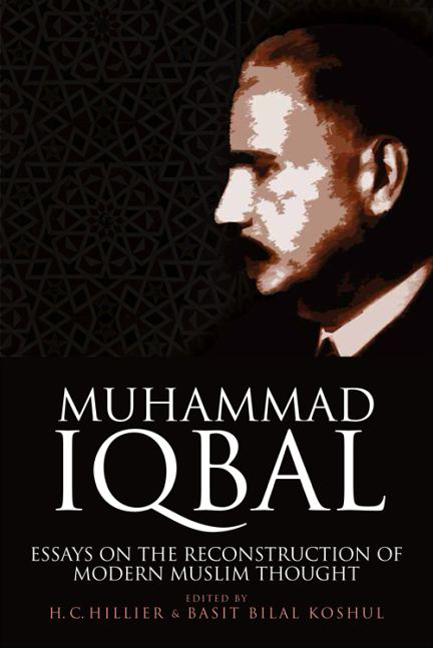Book contents
- Frontmatter
- Contents
- Preface
- 1 Introduction
- 2 The Human Person in Iqbal's Thought
- 3 Achieving Humanity: Convergence between Henri Bergson and Muhammad Iqbal
- 4 The Contemporary Relevance of Muhammad Iqbal
- 5 Pragmatism and Islam in Peirce and Iqbal: The Metaphysics of Emergent Mind
- 6 Between Hegel and Rumi: Iqbal's Contrapuntal Encounters with the Islamic Philosophical Traditions
- 7 Reconstructing Islam in a Post-metaphysical Age: Muhammad Iqbal's Interpretation of Immortality
- 8 Iqbal, Bergson and the Reconstruction of the Divine Nexus in Political Thought
- 9 Muhammad Iqbal: Restoring Muslim Dignity through Poetry, Philosophy and Religious Political Action
- Index
2 - The Human Person in Iqbal's Thought
Published online by Cambridge University Press: 10 October 2017
- Frontmatter
- Contents
- Preface
- 1 Introduction
- 2 The Human Person in Iqbal's Thought
- 3 Achieving Humanity: Convergence between Henri Bergson and Muhammad Iqbal
- 4 The Contemporary Relevance of Muhammad Iqbal
- 5 Pragmatism and Islam in Peirce and Iqbal: The Metaphysics of Emergent Mind
- 6 Between Hegel and Rumi: Iqbal's Contrapuntal Encounters with the Islamic Philosophical Traditions
- 7 Reconstructing Islam in a Post-metaphysical Age: Muhammad Iqbal's Interpretation of Immortality
- 8 Iqbal, Bergson and the Reconstruction of the Divine Nexus in Political Thought
- 9 Muhammad Iqbal: Restoring Muslim Dignity through Poetry, Philosophy and Religious Political Action
- Index
Summary
Henri Bergson, the renowned French philosopher, wrote that each philosopher has only one great thing to say. This may also be true of Muhammad Iqbal (1875–1938) who greatly admired his French contemporary. In his own writings on poetry, philosophy, and politics, Iqbal had a singular preoccupation: the self or selfhood, called khudi, but that would be discussed in today's lexicon under the rubric of personhood, the human person, or the human condition.
Iqbal's contribution to modern Muslim philosophy and thought was not only his relentless effort to understand the impact of modernity on Islam and Muslims, but his writings also reveal his own titanic struggles to come to terms with a modern Muslim self and the construction of personhood in the early twentieth century. Iqbal was fully aware that ideas and concepts and the lifeworlds that humans inhabit were not givens but rather constantly constructed: societies were retooled conceptually and technologically; communities were constantly reconstructed in tandem with the evolution of the imaginaries and spirits of individuals.
Therefore, Iqbal could confidently appeal to Muslims to construct a new thought. He wrote challengingly saying: ‘Nor can the concepts of theological systems, draped in the terminology of a practically dead metaphysics, be of any help to those who happen to possess a different intellectual background’ (Iqbal 1999: 78). He fully understood the fact that the lived conditions of each epoch generated their own founding myths and metaphysics, even though there was also a succession of ideas, or what we would call the continuity and discontinuity of thought. When Iqbal offered some brief outlines of the ideas of pioneering figures who, in one way or the other, had renovated religious thought in Islam in the past, he was clearly trying to urge Muslims to find the optimal set of ideas for the human condition as experienced in his day. In his critical readings of scripture, theology, prayer, philosophy, and ethics in his pioneering lectures published as The Reconstruction of Religious Thought in Islam, Iqbal offered hints and delicately suggested pathways that he hoped others would pursue. The world of Islam, he proposed, ‘should courageously proceed to the work of reconstruction’, which was more than ‘mere adjustment to modern conditions of life’ (Iqbal 1999: 142).
- Type
- Chapter
- Information
- Muhammad IqbalEssays on the Reconstruction of Modern Muslim Thought, pp. 12 - 32Publisher: Edinburgh University PressPrint publication year: 2015

